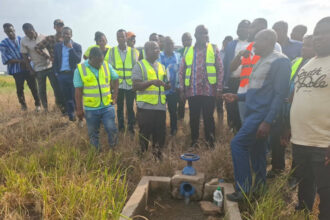One of the forward-looking news items during the past week that should gladden the hearts of child rights activists was headlined, “Kampala bans donations to street children.”
According to a BBC story published by the Daily Graphic on May 24th, city Councillors in Uganda’s capital, Kampala, have made it criminal offence to give money or food to street children beggars. Violators of the law could face up to six months in jail or a fine.
Back home in Ghana, child begging and street selling have been sore points in our claim to be child rights proponents. These children who hang around in traffic either begging for money or selling mean products are too vulnerable to abuses, in a world where child abuse has assumed dangerous dimensions.
Sometimes as young as six or seven years, these children who should be in the classroom or safe at home under parental care are thrown out there to solicit for money or sell so the family can subsist. That is absolute abuse and no country, having signed all the international conventions on the rights of the child should be seen supervising such cruel exposure to its young ones.
Our half-hearted approach to the issue of child beggars and street selling betrays us in many ways. Our problem is that we do not seem to focus enough on child issues. It was a delight to some of us when in October last year the Department of Social Welfare, in conjunction with the Ministry of Gender, Children and Social Protection made public that they had taken 71 child beggars off the streets of Accra and had reunited some of them with their families.
The operation, code-named “Operation get off the street for a better life”, meant that the Department of Social Welfare and the Ministry had seen everything wrong concerning the exposure of children to streetism and needed to protect the dignity of such children.
Though one would have expected to see the operation extended to child hawkers, it did not and the so-called operation also seems to have been aborted because one still sees many more children begging and selling out there. One wonders if “Operation get off the street for a better life” has failed just a few months after its successful launch.
Exemplary move
The move by the city authorities in Kampala is exemplary for the sake of the future of our continent and the leaders we are seeking to raise. If we accept therefore that street begging and selling by children is detrimental and a clear indictment on our conscience as citizens, then we should all do what is necessary to get the phenomenon outlawed.
Every child, from a poor or rich background, able or disabled, has the fundamental rights to care, health and education. It is, therefore, the duty of every parent to take charge and care for their children and be wholly responsible for their well being including sending them to school. One sees parents and other adults bringing children, sometimes disabled, to the streets to beg for money.
If child labour is wrong, so should street begging or hawking by children. If parents are failing their children, denying them of the right to education and using them to raise money to supplement the family’s needs, then the state has a duty to step in. One should expect to see the presence of our social welfare system where it is needed most. The consequence of child street beggars and hawkers would come back to bite us in future so if a total ban is the way to stop the abuse, let us push for it as the piecemeal approach is not taking us anywhere.
Street begging and selling are said to be linked to sexual exploitation and child trafficking, two grievous exploitations we cannot afford to overlook. We definitely need the boldness of the city authorities in Kampala to also tackle this problem on our hands. Protection to our vulnerable children should be seen both in word and deed. The future of our country would depend largely on the kind of children we raise today. Need we toy with it?
Source: Reality Zone with Vicky Wireko














